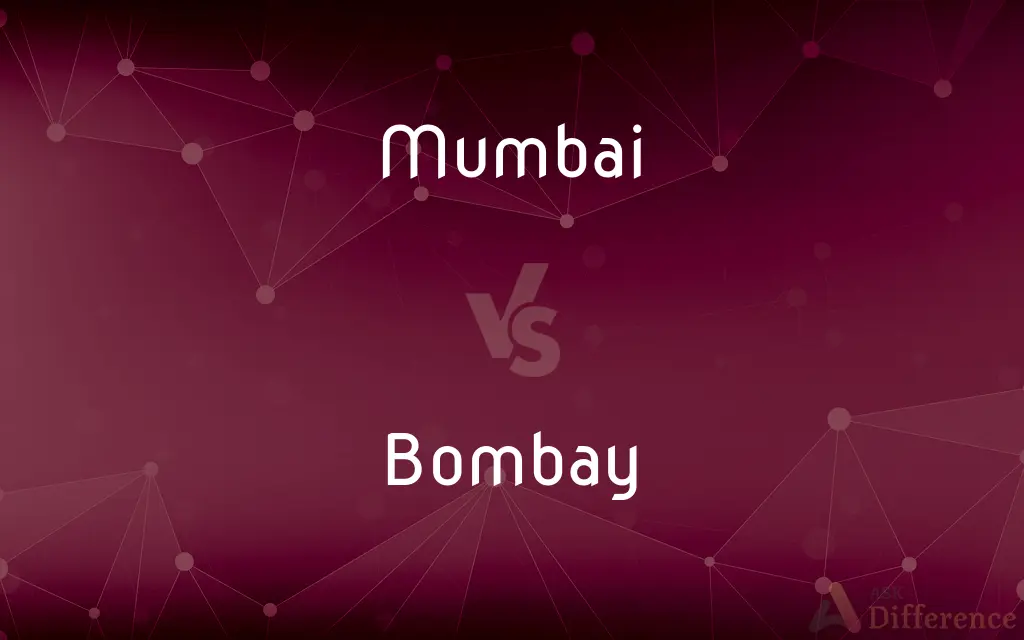Mumbai vs. Bombay — What's the Difference?
By Urooj Arif & Fiza Rafique — Updated on May 2, 2024
Mumbai, officially renamed in 1995, is the modern name reflecting local Marathi language and heritage; Bombay was its colonial name used until 1995, showcasing its British-era origins.

Difference Between Mumbai and Bombay
Table of Contents
ADVERTISEMENT
Key Differences
Mumbai is the official name of the city formerly known as Bombay, adopted in 1995 to reflect local Marathi pride and cultural identity. Whereas Bombay was the name used during the British colonial period, carrying a legacy of Western influence.
Mumbai is now associated with a burgeoning economy, being the financial and entertainment capital of India, emphasizing its modernity and global presence. On the other hand, Bombay evokes a nostalgic era marked by colonial architecture and historical tales.
The use of Mumbai signifies a political and cultural shift towards reclaiming indigenous names as part of a broader movement across India. Conversely, Bombay is often still used in cultural contexts, reflecting an enduring affection for the city's cosmopolitan past.
In administrative and official contexts, Mumbai is preferred, aligning with nationalistic sentiments and formal communications. Whereas, Bombay remains popular in casual speech and among certain age groups, underscoring its deep-rooted familiarity.
The transition from Bombay to Mumbai marked an important moment in the city's history, symbolizing a break from its colonial past and a step towards self-identification. On the other hand, the continued use of Bombay by some signifies a connection to its historical identity that many still cherish.
ADVERTISEMENT
Comparison Chart
Official Name
Mumbai (since 1995)
Bombay (until 1995)
Cultural Association
Represents modern India
Evokes colonial heritage
Usage
Preferred in official terms
Still used informally
Political Context
Reflects local nationalism
Colonial legacy
Historical Moment
Name change in 1995
Used extensively pre-1995
Compare with Definitions
Mumbai
Capital of Maharashtra state.
Mumbai hosts the state government’s headquarters.
Bombay
The setting for many Bollywood films.
Classic Bollywood movies often showcased the streets of Bombay.
Mumbai
Significant port city on India’s west coast.
Mumbai’s ports handle a significant portion of India’s maritime trade.
Bombay
Known for its Victorian Gothic architecture.
Bombay features the iconic Chhatrapati Shivaji Terminus.
Mumbai
Known for its diverse culture and bustling life.
Mumbai never sleeps, with activity around the clock.
Bombay
Hub of Indian cricket in the 20th century.
Bombay was considered the heart of Indian cricket.
Mumbai
India's largest city and financial center.
Mumbai is home to the Bollywood film industry.
Bombay
Former name of Mumbai until 1995.
Bombay was renamed to Mumbai in 1995.
Mumbai
Site of historic events and landmarks.
Mumbai has landmarks like the Gateway of India.
Bombay
Cultural mix of diverse communities.
Bombay has a rich history of Zoroastrian, Hindu, and Muslim influences.
Mumbai
Mumbai (English: , Marathi: [ˈmumbəi]; also known as Bombay , the official name until 1995) is the capital city of the Indian state of Maharashtra. According to the United Nations, as of 2018, Mumbai is the second-most populous city in the country after Delhi and the seventh-most populous city in the world with a population of roughly 20 million.
Bombay
Former name (until 1995) for Mumbai
Mumbai
A city in western India just off the coast of the Arabian Sea; India's 2nd largest city (after Calcutta); has the only natural deep-water harbor in western India
Bombay
A city in western India just off the coast of the Arabian Sea; India's 2nd largest city (after Calcutta); has the only natural deep-water harbor in western India
Common Curiosities
When was Bombay officially renamed to Mumbai?
Bombay was officially renamed to Mumbai in 1995.
Why was Bombay renamed to Mumbai?
Bombay was renamed Mumbai to reflect local Marathi language and heritage, and reduce colonial connotations.
Are Bombay and Mumbai the same city?
Yes, Bombay and Mumbai refer to the same city, with the name change occurring in 1995.
What does the name Mumbai mean?
Mumbai is derived from 'Mumba', a local deity Mumbadevi, and 'Aai', meaning mother in Marathi.
What are major differences in using Mumbai vs. Bombay in conversation?
Using Mumbai often reflects current and official contexts, whereas Bombay might indicate historical or nostalgic contexts.
What industries dominate Mumbai?
Finance, entertainment (Bollywood), and maritime trade dominate Mumbai’s economy.
What is the significance of Mumbai in India?
Mumbai is a major economic hub, cultural center, and the most populous city in India.
Can Mumbai and Bombay be used interchangeably in official documents?
No, Mumbai is preferred in all official and legal documents.
Do people still use the name Bombay?
Yes, many people still use the name Bombay informally and in cultural contexts.
Is Bombay considered offensive?
Not typically, but using Mumbai is more politically and culturally appropriate today.
How has Mumbai's culture evolved from Bombay's?
Mumbai's culture continues to evolve with modern influences while maintaining the cosmopolitan and diverse spirit of Bombay.
Share Your Discovery

Previous Comparison
Promise vs. Proverb
Next Comparison
Standby vs. IdleAuthor Spotlight
Written by
Urooj ArifUrooj is a skilled content writer at Ask Difference, known for her exceptional ability to simplify complex topics into engaging and informative content. With a passion for research and a flair for clear, concise writing, she consistently delivers articles that resonate with our diverse audience.
Co-written by
Fiza RafiqueFiza Rafique is a skilled content writer at AskDifference.com, where she meticulously refines and enhances written pieces. Drawing from her vast editorial expertise, Fiza ensures clarity, accuracy, and precision in every article. Passionate about language, she continually seeks to elevate the quality of content for readers worldwide.
















































